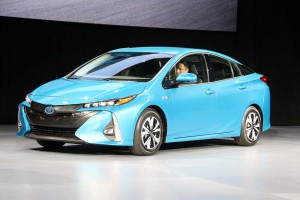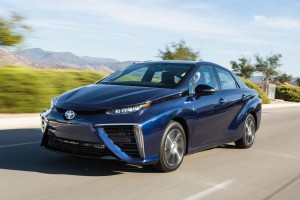
The Toyota Prius Prime added a plug this time around, helping the automaker take advantage of the growing trend toward plug-ins.
Toyota, the company that gave the world its first mainstream gasoline-electric vehicle, says it now expects plug-ins to gain traction faster than conventional hybrids.
The revelation by the man known as the “father of the Prius” is the latest in a series of ongoing shifts in Toyota’s approach to green technologies. Long wary of lithium-ion technology, the Japanese maker is putting more emphasis on more advanced battery vehicles, including both plug-ins and pure battery-electric models. It also appears to be growing more cautious about hydrogen power.
“Mr. Toyoda himself is leading the charge toward more electrification for the company,” said Brian Bolain, U.S. Lexus brand chief.
In fact, Toyota says it will have to recall 2,800 of the Mirai fuel-cell vehicles now on the road due to electrical problems with the “stacks” used to generate power for their electric motors.
In the nearly two decades since it first came to market, the Toyota Prius has become the world’s best-selling hybrid-electric vehicle. All told, the maker announced this week, it has now sold more than 10 million conventional hybrids, offering the technology on 40 different models. But the Prius and other HEVs have been losing momentum in recent months, and analysts believe that low fuel prices are only part of the problem.
They point to a wide range of new alternatives, including plug-in hybrids, or PHEVs, as well as new, longer-range pure battery-electric vehicles, or BEVs.

Toyota's Mirai fuel-cell vehicle is subject to a recall due to problems with the "stacks" used to generate the electricity needed to power the vehicle.
“Environmental awareness has become a bigger issue today than it was 20 years ago, and demand for environmentally conscious products has increased,” said Toyota executive Takeshi Uchiyamada, during a news conference in Japan to mark the official launch of the Prius Prime, the new plug-in version of the familiar hybrid.
(Fuel-cell vehicles need more time, says Toyota chairman. To see the story, Click Here.)
The Prime relies on lithium batteries, rather than the less energy-dense nickel-metal hydride cells used in the original Prius. The second-generation plug-in, meanwhile, nearly doubles its range operating solely on batteries to around 25 miles, and can remain in EV mode at highway speeds. The original hybrid Prius can barely manage two miles at low speeds.
Toyota hopes to sell about 60,000 Prius Primes annually, a fraction of the worldwide sale of the regular Prius. But after a slow start for the original plug-in, Uchiyamada said he expects the new model to gain traction quickly, especially when it rolls out in North America and Europe.
Toyota signaled its growing interest in more advanced, lithium-based vehicles late last year, as TheDetroitBureau.com reported, a move reflecting both the competitive environment and increasing political pressures.
“China has been pressuring Toyota,” a well-connected comnpany source said, noting that the Asian nation has been aggressively promoting electrification as a way to address its endemic smog problems. U.S. regulators and clean advocates are also calling on Toyota to deliver battery cars, he said, adding, “That’s the big change for us.”
(Toyota shifting resources to battery power. Click Here for the story.)
Bob Carter, the head of Toyota’s automotive operations in the U.S. also confirmed that Toyota will be adding more plug-in and pure battery-electric models in the coming years. The company won’t abandon its familiar HEVs, like the conventional Prius, but it will rapidly expand its line-up of those other options.
Toyota is by no means alone. Manufacturers as far afield as Ford, Volkswagen and BMW are rapidly increasing their battery-based model lines, with an emphasis on PHEVs and BEVs. VW is set to launch an entire sub-brand to handle its offerings, dubbed VW I.D. Daimler is taking a similar approach with its new Mercedes-EQ sub-brand. Mercedes expects to have 10 plug-ins alone on the global market by the end of 2017.
One technology that could suffer as a result is Toyota’s fuel-cell program. While Carter and other officials insist the carmaker remains committed to hydrogen power, they admit it will be hard for it to gain traction without a massive – and costly – build-up of the hydrogen production and distribution infrastructure.
The maker has, meanwhile, announced that it is recalling all 2,840 of the Mirai fuel-cell vehicles it has sold worldwide. Under certain conditions, notably when a driver slams the throttle to the floor after coasting in cruise control, the system could generate excess voltage.
(Toyota studying hydrogen heavy truck applications. Click Here for more.)
Toyota is currently one of three automakers selling fuel-cell vehicles in the U.S. market.
